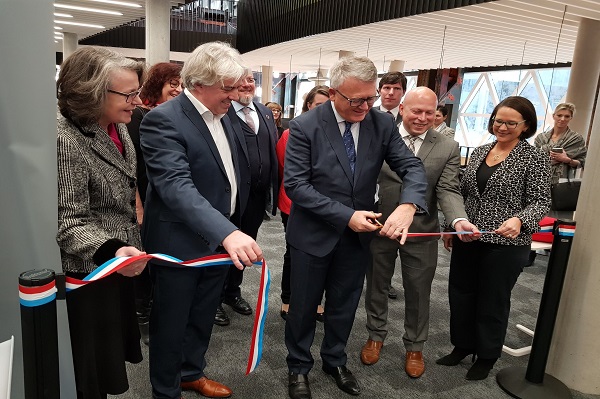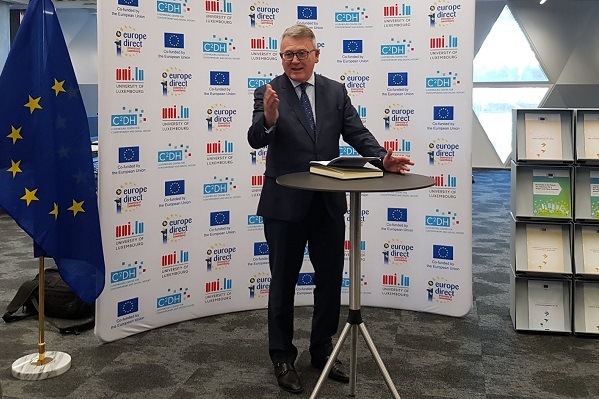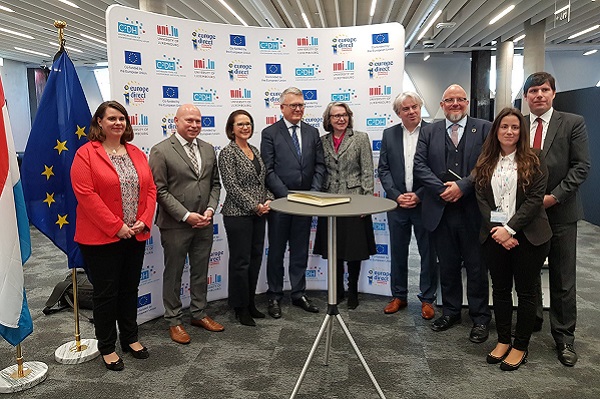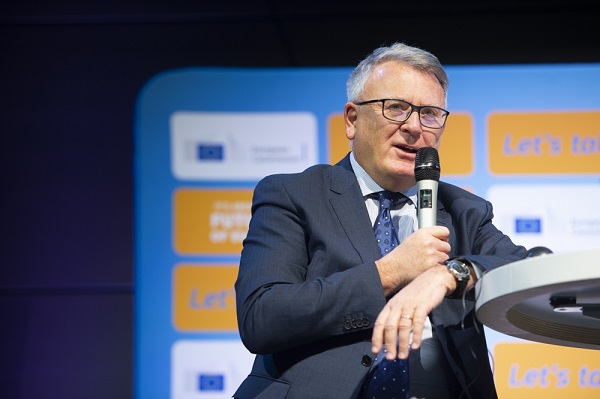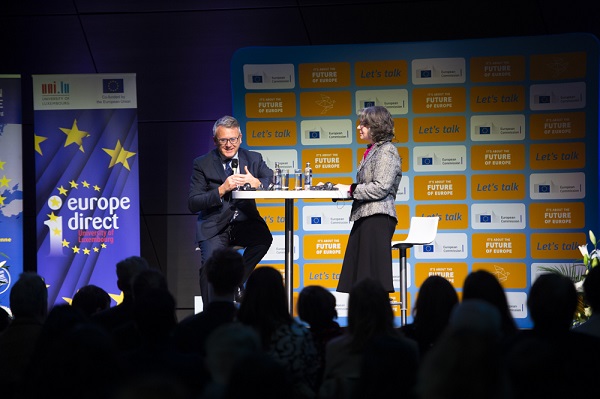 EU Commissioner Nicolas Schmit and Dr Elena Danescu;
Credit: © European Union, 2020
EU Commissioner Nicolas Schmit and Dr Elena Danescu;
Credit: © European Union, 2020
On Monday 20 January 2020, the University of Luxembourg hosted two EU-related events on its Belval campus: the opening of a new Europe Direct Information Centre (EDIC) and Luxembourg’s first citizens’ dialogue under the new European Commission with Commissioner Nicolas Schmit.
New EDIC University of Luxembourg
Firstly, Dr Elena Danescu, Research Scientist at the Luxembourg Centre for Contemporary and Digital History (C2DH) and Head of the EDIC University of Luxembourg, invited EU Commissioner Nicolas Schmit to officially open the new EDIC at the Luxembourg Learning Centre. The ribbon-cutting ceremony was followed by speeches by Dr Elena Danescu, Nicolas Schmit and Stéphane Pallage, Rector of the University of Luxembourg.
During his speech, Nicolas Schmit, who is the current EU Commissioner for Jobs and Social Rights and a former Luxembourg MEP, stressed the importance of knowledge and understanding for the past, present and future of the European Union. He particularly emphasised the success of the Erasmus programme, which is an obligatory part of the University of Luxembourg’s bachelor programmes. He described Erasmus as “a symbol of [an] open Europe”, adding that one way of revitalising the European project and fostering a sense of European identity was to "root young people in this European community".
Speaking of the EDIC itself, which joins the country’s two other such centres (located in Schengen and Munshausen respectively), Nicolas Schmit highlighted the centre’s important role in bringing the EU closer to its citizens and thus building on a European identity, which is currently under threat from issues such as rising nationalism and populism. He concluded that it was through knowledge and openness, as well as a deep understanding of the past, that we can address these challenges and “include everyone in the project that is the future of Europe”.
Citizens’ Dialogue
The official inauguration of the new EDIC University of Luxembourg was followed by the Citizens’ Dialogue at the Maison des Arts et des Étudiants. On this occasion, Commissioner Nicolas Schmit presented and discussed with the public his mission of strengthening the EU’s social dimension.
Dr Elena Danescu moderated the event, which attracted over 300 people representing various sections of Luxembourg society, including members of the Grand Ducal family, former and current MEPs, 120 students from Lënster Lycée, Lycée Josy Barthel Mamer and the European School Luxembourg, students from the University of Luxembourg and members of the Luxembourg press, among others.
In his opening speech, Prof. Dr. Jens Kreisel, Vice-Rector for Research at the University of Luxembourg, emphasised the role of the university, and education in general, in facilitating lives through research and preparing students for the digital transformation. He recalled that this year would see the creation of a new Centre for Digital Ethics at the University of Luxembourg aimed at promoting responsible digitalisation.
Yuriko Backes, Head of the Representation of the European Commission in Luxembourg (which co-organised the event), also gave a speech during which she highlighted the pilot project of the new Commission, the European Green Deal, and its many aspects from investing in sustainability and biodiversity to new strategies for a circular economy and industrial and agricultural policy. She added that Commissioner Nicolas Schmit's mission regarding the "omnipresence of the social and solidarity with the weakest in society" in the climate and digital transition presented a big challenge, one which can only be overcome if everyone is involved. Ms Backes concluded by reiterating the European Commission's belief that democratic participation and dialogue should also be strengthened and exchanges intensified, for instance in Citizens' Dialogues such as today's.
Moderator Dr Elena Danesco then introduced Nicolas Schmit and recognised his long-term involvement in and commitment to social and European affairs. She invited Mr Schmit, who formerly served as Luxembourg's Minister-Delegate for Foreign Affairs and Immigration, Minister of Labour, Employment and Immigration and an MEP, to introduce himself in more detail before opening the debate to the audience.
In keeping with the subject of technology and digitalisation, audience members could ask questions either by raising their hand or via Slido, an interactive Q&A and polling platform. Questions covered an array of subjects, namely plans for a minimum social wage, poverty, (youth) unemployment, the potential impact of digitalisation on the labour market, social and digital inclusion, upskilling, gender equality and health in the workplace and the integration of refugees into the EU economy.
In his responses, Nicolas Schmit particularly emphasised that the proposed minimum social wage in Europe is mainly aimed at restoring the dignity of work through the creation of a framework offering greater transparency in this area. Regarding poverty, Mr Schmit stressed the need to continue to fight against inequalities and the very real poverty that exists in Europe through inclusion policies. He stated: "Poverty is a loss for society. [...] We need to give all young people the opportunity to be well educated and meet the [increasing] demands of the job market". Similarly, on the topic of jobs and the digital transformation, he recalled the importance of education and preparing citizens of all ages in what he described as a "skills revolution". In response to a later question, he added that "almost half of employees should be upskilled" in the coming years, regardless of their age and that this may require a reevaluation of work organisation.
Turning to the issue of gender equality in the workplace, Nicolas Schmit recalled that this was "a key question for the European Commission". He added that "transparency is key" and "should be ensured at the European level". Concerning youth unemployment and potential measures aimed at warding off another economic crisis, the EU Commissioner for Jobs and Social Rights first emphasised the need for Europe to maintain a strong economy, encompassing significant investment (for instance, in new technologies and the green / climate transition) and job creation. He added that his wish is for all young people to have the necessary skills in new technology to take up these new positions. Mr Schmit also stressed the need for an industrial strategy, as well as a good macroeconomic policies in order to avoid another economic crisis. On a related note, Nicolas Schmit responded to claims that Europe was "in decline" with the argument that young people should be given "the opportunity to be in the future of Europe", adding that "if Europe wants, she will form part of the future of the world".
In response to a question on the integration of refugees into the EU economy, Nicolas Schmit recalled that it is an "essential value of Europe to welcome people [...] from other countries and to offer them another chance". He added that this was an opportunity for both those who arrive in Europe and their host countries, which should offer these people the possibility either to get a job or to first receive an education or a better or different type of training that prepares them for the job market. He concluded that this represented "a win for all".
The talk was followed by a reception provided by the Representation of the European Commission in Luxembourg, which organised this event together with EDIC University of Luxembourg.

